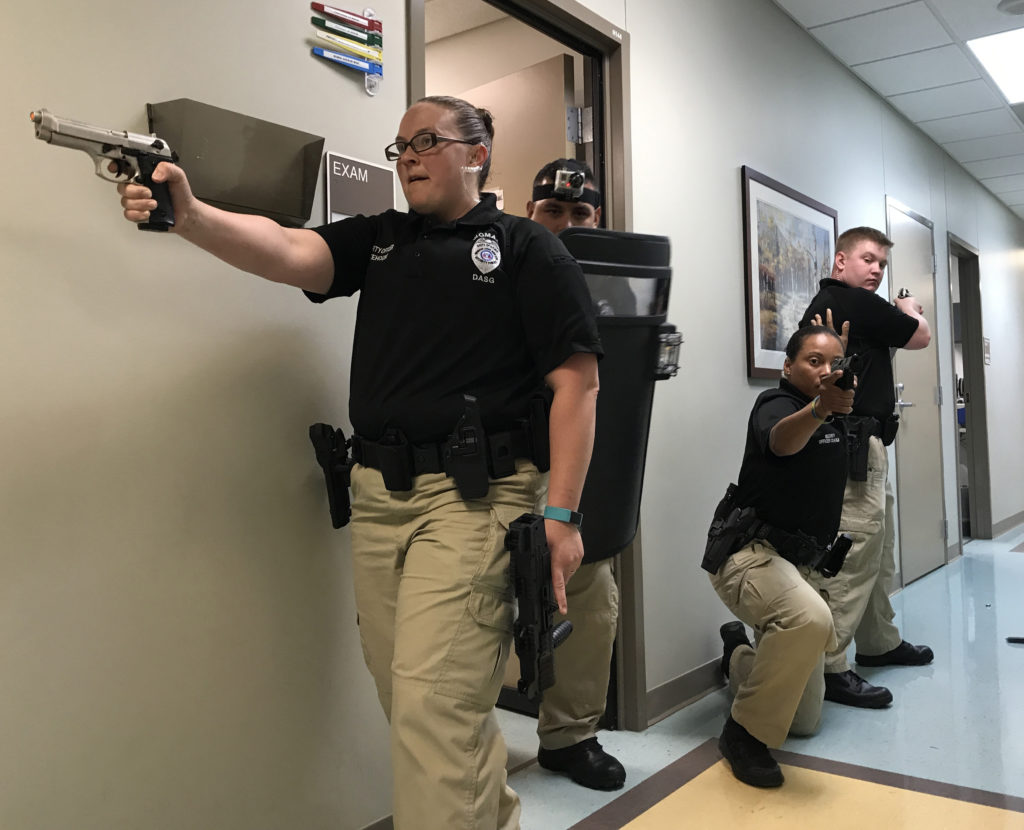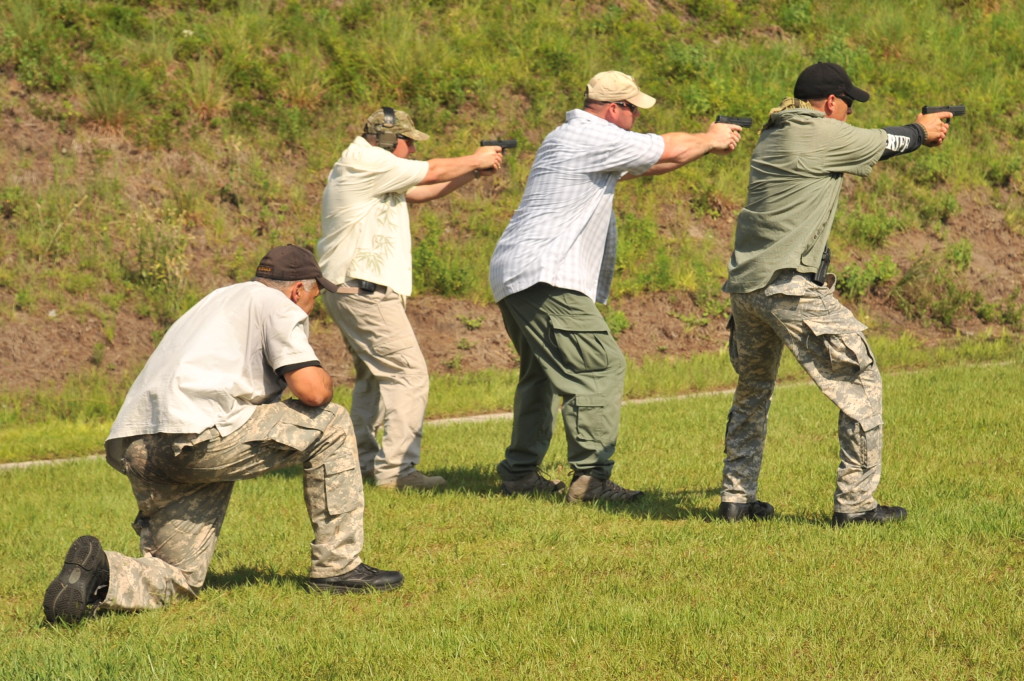7 Reminders That Could Save You After a Shooting
Are you trained for the aftermath of a shooting? As a Bodyguard you are trained to protect your client. But way to often not much thought goes into covering your own butt. Now I’m not talking about being safe in the field, that’s a given. I’m talking about protecting your job and your assets. The following points are geared more toward LEO, but there are a couple that are advantageous for EP’s as well particularly points number one and three. This list is not intending as a comprehensive protocol but only as a caution against some potential pitfalls

1. Have a personal attorney in place. You want the means of defending yourself established before a defense is ever required. The time to learn life-saving skills is not when your life is as risk,” and by the same token the time to learn what to do after a shooting is not when smoke from your gun is still hanging in the air.
You need to find the right attorney NOW to work with you when you need him. “Unless you have been through a shooting aftermath, you are wholly unprepared for the experience. Get an attorney who knows something about officer-involved shootings. If he doesn’t know, do what you can to educate him and urge him to attend some courses to learn.
“He has to be willing to come out to a shooting scene at 3 or 4 o’clock in the morning when you call him.” Once the shooting stops, “he should be watching and counseling you on every aspect of what you do.”
Study Your Agency’s Shooting Policies
2. Study your agency’s policies. Part of your responsibility is to know, understand and follow your department’s policies on deadly force and related matters. “If the policy says don’t fire warning shots, then don’t. Unfortunately , many officers don’t study policy except after a shooting.”
If there’s a policy you disagree with or that’s ill-conceived, work to get it changed before you feel you have to violate it. For example, a department may say you can’t shoot at or from a moving vehicle. So if you are under attack are you supposed to just stand there and let an offender shoot you just because he happens to be in a car? Of course not!” But it would be better if you could get the policy rewritten to allow for exigent circumstances.

The Judgment Aspect of Shooting
3. Maintain training records. Inadequate records of your training or no records at all “will hurt you badly. Maintain your own file of training records apart from whatever your agency keeps, as backup.
You need solid documentation that you have trained and retrained in firearms skills, that you understand tactics and that you have been instructed in “the judgment aspect of shooting-not how, but when. If you have trained to shoot against a piece of paper, with no stress involved, then you have been prepared only to shoot the next piece of paper you encounter.”
Keep records too of force-related training you pursue on your own, outside of what your department mandates or pays for.
Limit Your Comments at The Shooting Scene
4. Limit your comments at the shooting scene. An involved officer needs to provide information on only four essential subjects before leaving a shooting scene:
- known injuries that require immediate intervention;
- the location of the offender(s). If they’re not dead or visible they may still be in the area, constituting a potential threat;
- any evidence that needs to be identified and protected from loss, contamination or destruction. Guns or other weapons especially will need to be guarded;
- the identification of witnesses who should be isolated and questioned.
An officer should not be asked at the scene what happened. There may be media people around trying to record what you say, witnesses nearby who will overhear.” You may blurt out, “I don’t know” when you’re still a bit dazed at the scene, then later when you give a detailed statement your veracity could be questioned.
“The officer should be removed from the scene as soon as possible. Don’t put him in the back of a squad car; that’s where offenders go. Don’t take away his firearm on the street and make him feel like he did something wrong.” That necessary chore should be done with tact, in private.
Many Officers Have Hypertensive Even Before a Shooting
5. Request an immediate hospital check. As an involved officer, you should be taken from the shooting scene directly to a medical facility, “even if you have no observable injuries and are free of pain. Absence of pain is not a good indicator of your condition. You could be injured seriously and not feel any pain because of the stress you’re under.”
Many officers already are hypertensive even before a shooting. Afterward, “your blood pressure is going to be through the roof.” He has known shooting survivors whose pressure measured 180/110 as long as 90 minutes after the encounter, despite their being athletically fit. “If your blood pressure isn’t checked and brought down, you could possibly suffer a stroke. You need to be protected from melting down internally.”
Go to hospitals in your area and “prepare the ER people for a shooting response. Talk to the charge nurses-the first sergeants of the ER-and advise them that any in-coming officer will need immediate attention in a protected area.”
Don’t Give a Statement After a Shooting
6. Sleep before giving a statement. Don’t give a statement to investigators on the same day as the shooting.
In effect, “your body is under the influence of naturally occurring drugs, including adrenalin. Your heart rate is elevated. Your system needs a period of time to slow back down. You wouldn’t be allowed to take a criminal’s confession if he was under the influence of drugs. Why should you be put at risk by having to give a statement under comparable circumstances?”
There are cases in which officers, after a shooting, have been told to write a statement after having been awake for 36 straight hours. That’s not only inhumane but counterproductive for everyone involved, in his opinion.
“You need to be able to reconstruct your memory” after the physical and psychological shock of a shooting, he said. Studies have shown that at least “one sleep cycle is necessary” to reestablish your memory. After sleeping, “you’ll recall much better” what really happened.
Don’t Take The Job on by Yourself
7. Involve your attorney in preparing your statement. Don’t take that job on by yourself, you’re not trained or prepared to do it”-and the stakes can be incredibly high. Your statement will be the core issue in demonstrating that what you did was legal.

One officer who was fired after a perfectly lawful shooting, in large part because of innocent inconsistencies and other deficiencies in his official statement of the event. “It took him six years to get his job back. A review board member in that case stated bluntly: We don’t have to believe the best of what you told us, we can believe the worst of what you said.
Your attorney can help you construct a framework for your statement, and with his assistance you should write down what you are going to say. At the top of this paperwork, “you should put ‘Confidential: Attorney-Client Privileged Information.'”
You want to draft a “time line” of the shooting day, beginning with what you did and how you were feeling before you went to work (this may be used later to illuminate your frame of mind) through what you did after the confrontation (noting that you administered first aid to the downed offender, for example). It’s a step-by-step process, “like peeling away an onion.
Your attorney can help you address areas in which you are likely to have mistaken impressions. For example, he said, “You won’t be able to remember time or distance properly. You will always be wrong.” It’s common for a surviving officer to believe that a shooting lasted about three seconds. Yet with the average officer able to fire one round in a quarter-second, the typical encounter is generally over much quicker. “When it comes to statements, small discrepancies can have a big impact.”
Know Everything You Are Going to Say
By the time you finish working with your attorney, “you should know everything you are going to say, in chronological order, before you give your official statement.”
A uniform post-shooting protocol accepted by agencies throughout the U.S. “We need consistency in officer-involved shooting investigations and consistency in the way officers are treated” after being involved in life-threatening situations.
But until that utopia arrives, he urged the audience to “train for the aftermath of a shooting as significantly and as urgently as you train for a shooting itself.
“It’s up to you,” he said. Prepared for the experience, you can successfully face what you’ll have to deal with “and then get on with your life” or unprepared you can potentially fall victim “to a tragic event that will ruin your life forever.”
This article was written by Chuck Remsberg.
Warmest Regards
Founder of Bodyguard Careers
Harlan (Hucky) Austin


Leave a Reply